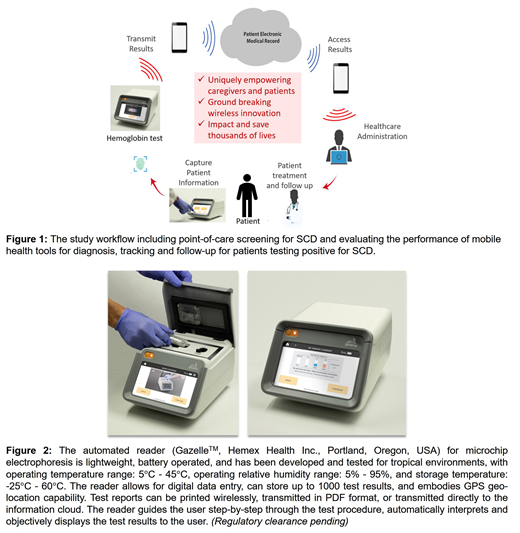Nigeria leads the world in the number of cases of sickle cell disease (SCD). An estimated 150,000 babies are born annually in Nigeria with SCD, a heredity disorder, and 70-90% die before age 5. Only a small portion of affected infants and children in sub Saharan Africa (SSA) reach adolescence. Over 650 children die per day in sub-Saharan Africa from SCD. These dismal statistics are in sharp contrast to outcomes in high-income countries (HICs) where more than 90% of SCD patients reach adulthood.
The World Health Organization (WHO) estimates that 70% of deaths could be prevented with a low cost diagnostic and treatment plan. Meaningful preventive care and treatment cannot be implemented without a structured plan for early diagnosis and patient tracking.Early diagnosis requires improved access to parents and guardians of children with SCD, and gaining this access remains a challenge in most of SSA. In 2015, Nigeria's Kano state government, with support from foreign partners, established a community-based program for newborn registration. This platform provides unique access to newborn babies in one of Nigeria's most populous cities, but still lacks a functioning patient testing, tracking, and monitoring system, which we plan to address in our ongoing study. This study will introduce mobile health in a low-income country with low literacy rate and hopefully accustom that segment of the population to more varied mobile health applications that will ultimately improve their health in the long run.
Our current operational platform in Kano, Nigeria provides access to a large population with a high prevalence of SCD. We have previously completed pilot testing of 315 subjects for SCD using our microchip electrophoresis test. We are planning to test up to 4,500 additional subjects less than 5 years of age at Murtala Muhammed Specialist Hospital. The hospital staff includes 97 physicians and 415 nurses and outpatient clinics serve about 30,000 patients monthly. The maternity department has a 200-bed capacity and the antenatal clinic performs about 1,000 deliveries and serves an average of 3,000 mothers monthly. Enrollment is planned to start on September 15, 2019 and medical staff are currently being trained to run the tests. Our study is registered in the United States National Library of Medicine's ClinicalTrials.gov (Identifier: NCT03948516).
Our technology is uniquely paired with an automatic reader and an Electronic Medical Record (EMR) and patient management solution to record POC test results, register new cases, and track patients for follow-up (Fig. 1). The reader enables automated interpretation of test results, local and remote test data storage, and includes geolocation (Global Positioning System) (Fig. 2). The system will generate reports for all cases of SCD, track hospital visits, appointments, lab tests, and will have mobile and dashboard applications for tracking patients and samples. The application will be installed on mobile devices provided to users. The proposed system will be compliant with the existing privacy standards to handle medical data (e.g., HIPAA in the US and GDPR in the EU). All communications between the parties will be secured via end-to-end encryption as a safeguard.
We anticipate that our project will increase the rates of screening, diagnosis and timely treatment of SCD in Kano State of Nigeria. The project's broader impact will likely be the ability to track and monitor screening, disease detection, diagnosis and treatment, which can be scaled up to the whole nation of Nigeria, then to sub-Saharan Africa. The data obtained and analyzed will be the first of their kind and will be used to inform the design of programs to improve access to, and availability of, effective care for this underserved populations. The importance of increased access to diagnosis and treatment should not be underestimated - it is crucial for realizing effective management of people with SCD. The impact can be enhanced by complementing diagnosis and patient tracking with education for the families so they can provide or seek the necessary preventative treatment. Identification of the location of the patients in need would help identify the areas where family, parent, caregiver education should be provided.
Fraiwan:Hemex Health, Inc.: Equity Ownership, Patents & Royalties. Hasan:Hemex Health, Inc.: Equity Ownership, Patents & Royalties. An:Hemex Health, Inc.: Patents & Royalties. Thota:Hemex Health, Inc.: Employment. Gurkan:Hemex Health, Inc.: Consultancy, Employment, Equity Ownership, Patents & Royalties, Research Funding.
Author notes
Asterisk with author names denotes non-ASH members.


This feature is available to Subscribers Only
Sign In or Create an Account Close Modal